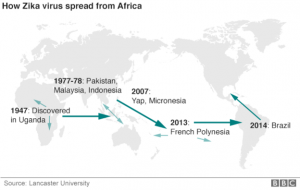The infection, which causes symptoms including mild fever, conjunctivitis and headache, has already been found in 21 countries in the Caribbean, North and South America.
It has been linked to thousands of babies being born with underdeveloped brains and some countries have advised women not to get pregnant.
No treatment or vaccine is available.
The virus was first detected in 1947 in monkeys in Africa. There have since been small, short-lived outbreaks in people on the continent, parts of Asia and in the Pacific Islands.
But it has spread on a massive scale in the Americas, where transmission was first detected in Brazil in May 2015.
Large numbers of the mosquitoes which carry the virus and a lack of any natural immunity is thought to be helping the infection to spread rapidly.
Mosquito
Zika is transmitted by the bite of Aedes mosquitoes, which are found in all countries in the region except Canada and Chile.
In a statement, The Pan American Health Organization (PAHO), the regional office of the WHO, said: “PAHO anticipates that Zika virus will continue to spread and will likely reach all countries and territories of the region where Aedes mosquitoes are found.”
PAHO is advising people to protect themselves from the mosquitoes, which also spread dengue fever and chikungunya.
It also confirmed the virus had been detected in semen and there was “one case of possible person-to-person sexual transmission” but further evidence was still needed.
Around 80% of infections do not result in symptoms.
But the biggest concern is the potential impact on babies developing in the womb. There have been around 3,500 reported cases of microcephaly – babies born with tiny brains – in Brazil alone since October.
PAHO warned pregnant women to be “especially careful” and to see their doctor before and after visiting areas affected by the virus.
Colombia, Ecuador, El Salvador and Jamaica last week recommended women delay pregnancies until more was known about the virus.
Although officially PAHO says “any decision to defer pregnancy is an individual one between a woman, her partner and her healthcare provider”.
Maria Conceicao Queiroz said there was a sense of fear where she lives near the Olympic Park in Rio de Janeiro: “Every one is at risk, we’re all scared of getting Zika.
“We’re surrounded with dirty water, polluted water, but what can we do but put repellent on, to try to keep the mosquitoes away.”
Global threat
Prof Laura Rodrigues, a fellow of the Brazilian Academy of Sciences and from the London School of Hygiene and Tropical Medicine, said some data suggested that up to one-in-fifty babies had birth defects in one of the worst hit areas – Pernambuco state in Brazil.
She said: “Until November we knew nothing, this has caught us by surprise and we’re trying to learn as fast as we can.
Ramin Sarajari Comments:
I understand from what I read from the news and what the WHO is reporting that Zika virus is spreading across South and Central America, health officials are increasingly looking at how it could impact the U.S., and whether it’s inevitable that the virus will become endemic in the U.S.
IN the USA, President Obama called in medical experts on Tuesday and called for “research efforts to make available better diagnostic tests, to develop vaccines and therapeutics, and to ensure that all Americans have information about the Zika virus and steps they can take to better protect themselves from infection.”
The virus is spread mainly through the Aedes aegypti mosquito, though it has been known to also spread through another mosquito species called Aedes albopictus. There is no vaccine or cure for the disease.
What is scary is that the World Health Organization (WHO) and the Pan America Health Organization said this week that they expect the virus to eventually reach “all countries and territories of the region where Aedes mosquitoes are found.” It is even more scary that the Olympic games are in Brazil this year! So we shall wait and see how we can find a remedy to this major challenge in the healthcare.

